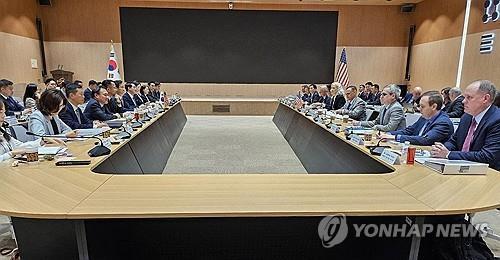- California Assembly OKs highest minimum wage in nation
- S. Korea unveils first graphic cigarette warnings
- US joins with South Korea, Japan in bid to deter North Korea
- LPGA golfer Chun In-gee finally back in action
- S. Korea won’t be top seed in final World Cup qualification round
- US men’s soccer misses 2nd straight Olympics
- US back on track in qualifying with 4-0 win over Guatemala
- High-intensity workout injuries spawn cottage industry
- CDC expands range of Zika mosquitoes into parts of Northeast
- Who knew? ‘The Walking Dead’ is helping families connect
S. Korea agrees to 8.3 pct increase in cost sharing for hosting U.S. troops
South Korea has agreed with the United States to raise its share of the cost for hosting American troops by 8.3 percent on-year in 2026, the foreign ministry said Friday, in the last-minute deal before a potential return of former U.S. President Donald Trump to the White House.
Under the five-year agreement, which will last until 2030, South Korea will pay 1.52 trillion won (US$1.14 billion) in 2026, up from 1.4 trillion won in 2025, for the upkeep of some 28,500 U.S. Forces Korea (USFK) personnel, the ministry said in a press release.
The Special Measures Agreement (SMA) was finalized Wednesday after eight rounds of negotiations over the past five months, the ministry said, just a month before the U.S. presidential election.
“Through constructive discussions, both countries reached a mutually acceptable and reasonable outcome,” the ministry said.

In a separate statement, U.S. State Department spokesperson Matthew Miller welcomed the deal.
“The agreement will be a significant accomplishment for both sides, and will strengthen our alliance and our shared defense,” he said.
“Since 1953, the alliance between the United States and the Republic of Korea has been the linchpin of peace, security and prosperity for Northeast Asia, the broader Indo-Pacific region and beyond.”
Tensions over the SMA strained the South Korea-U.S. alliance during Trump’s presidency. At the time, Trump accused South Korea of “free-riding” on U.S. military power and demanded a fivefold increase in Seoul’s contribution, totaling $5 billion.
The latest and 12th SMA will adjust contributions based on an annual increase linked to the Consumer Price Index (CPI), expected to be around 2 percent. This is a shift from the current system, which ties increases to the defense budget, currently growing at an average of around 4 percent annually.
As a result, the total cost-sharing amount for the years 2027-2030 will reflect the previous year’s average CPI increase, with the agreement capping the annual rise at a maximum of 5 percent, the ministry said.
“In particular, the introduction of the annual increase rate based on the CPI instead of the current defense budget increase rate, along with the reinstatement of a cap, is considered a significant achievement in this negotiation,” said Lee Jae-woong, a ministry spokesperson.
Compared with the 11th SMA, which was reached in 2021, the latest deal is designed to moderate the overall growth rate of South Korea’s contributions and prevent sharp increases, even in unforeseen economic conditions, the ministry said.
“In 2019, the budget reached 1.0389 trillion won, and if that trend continued, it could quickly rise to 2 trillion won. However, by switching to the CPI-based increase, we can significantly ease that pressure,” a ministry official who was part of the negotiation team said on the condition of anonymity.
Additionally, the agreement clearly states that South Korea’s cost sharing will only cover the maintenance and repair of U.S. military equipment used by USFK.
In the past, some funds were reportedly used to support the upkeep of U.S. equipment outside South Korea, raising concerns about whether the funds were truly benefiting U.S. operations here.
During Trump’s presidency, negotiations dragged on for months before South Korea eventually agreed to an 8.2 percent increase under a one-year deal, which was seen as unsustainable at the time.
During the 11th SMA negotiations, both sides agreed on a 13.9 percent increase under a six-year agreement, the largest annual rise in nearly two decades.
Observers note that South Korea has secured a relatively favorable deal, just one month ahead of the U.S. election.
“Given the challenging negotiation environment, an 8.3 percent increase is considered pretty good,” said Park Won-kwon, a professor of North Korean studies at Ewha Womans University.
Before the new agreement takes effect, it will undergo domestic procedures, including presidential endorsement and parliamentary approval, a process expected to take about at least two months.
Approximately 28,500 American troops are stationed in South Korea as part of efforts to deter the nuclear-armed North Korea.
Since 1991, Seoul has partially shouldered costs under the SMA for Korean USFK workers, the construction of military facilities and other logistical support.
khj@yna.co.kr











